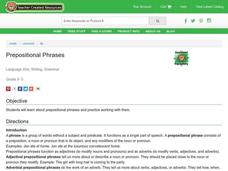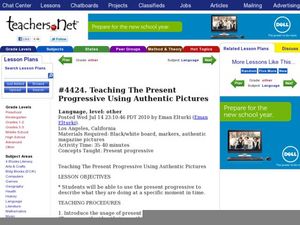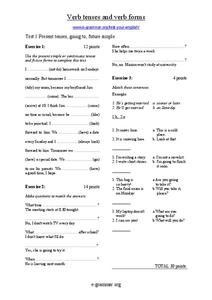Oxford University Press
Language Focus: Imperative Sentences, Future Progressive Tense
Finish your homework! Kids work on imperative sentences with a grammar worksheet, which also focuses on future progressive tense (going to). After they use a word bank to write instructions for a person going on a trip, they fill in the...
Study Champs
Emotions and Interjections
Connect emotions to grammar with a grammar exercise that taps into a little bit of creativity. Given an emotion, learners come up with a matching interjection. There are 10 emotions listed.
Study Champs
Interjection
Wow! Yes! Great! Practice identifying interjections! After reading through a definition and example of interjection, class members underline the interjections in each sentence.
Oxford University Press
Language Focus: Imperatives and Going To
Study the future progressive tense and other ways to express what will (or won't) happen. After completing affirmative and negative sentences in the imperative form, kids work on different exercises with going to and will or won't.
Oxford University Press
Language Focus: Simple Past Tense, Affirmative and Negative
Find out what people did or didn't do with a grammar worksheet, which focuses on the past tense of different verbs. After kids use a word bank to complete a paragraph, they use the words did and didn't in several exercises about...
Oxford University Press
Language Focus: Interrogative and Demonstrative Pronouns
Work on who, what, where, and how with several grammar activities. Additionally, kids complete sentences with demonstrative (relative) pronouns based on whether items are close or far away.
Tobii Dynavox
Sono Flex
Empower nonverbal learners with the gift of gab using this speech and language application. Offering hundreds of picture-supported words and phrases, it's easy for students who struggle with verbal communication to have meaningful...
Grammaropolis
Grammaropolis - Complete Edition
Allow the residents of this grammar-packed city to teach your pupils the parts of speech with songs, videos, quizzes, and more. Kids can get to know each part of speech and sing along with the catchy tunes!
Miami-Dade County Public Schools
Conventions Chart
Help your young writers pay close attention to their conventions and move toward revision with a straightforward chart. Learners can analyze 11 sentences on this page by noting down the first letter in each, the first of words in each,...
Curated OER
Connectives
Using connectives and conjunctions is an easy way to vary sentence structure. Third graders review the given connectives, then use them to combine two simple sentences. The second section allows learners to use more words and phrases as...
Curated OER
The Word Factory
Here is a clever way to help your 3rd and 4th graders add -ing to verbs. A list of 10 action verbs is given, and learners must adjust the spelling of each verb to accept the -ing ending. This would be an excellent choice for a homework...
Curated OER
Homophones and Homographs
Getting tired of correcting to, two, and too? What about weather and whether? Use a thorough lesson on homophones and homographs to clear up those differences. Fourth and fifth graders identify which words sound the same and are spelled...
Curated OER
Prepositions
Prepositions are an important part of descriptive writing. Fourth graders fill in the blanks with prepositions from a word bank, then write ten sentences with the remaining words.
Curated OER
Prepositional Phrases
There are two types of prepositional phrases: adjectival and adverbial. Gather teaching strategies from this resource to give your learners lots of practice and meet Common Core standards! First, review prepositions by providing a...
Curated OER
What's Going On? -- Present Progressive in Photos
Magazine photos of people in action provide opportunities for beginning and intermediate English learners to employ the present progressive (continuous) verb tense. Partners describe what people are doing and share their sentences with...
Curated OER
Complete Sentences
Being able to distinguish between a complete sentence and an incomplete sentence is an important skill, one set as a standard by the Common Core initiative. This presentation does a shows viewers what it takes to make a complete...
Arizona State University
They're, Their, and They're
Clear up the difference between they're, their, and there once and for all! A reference sheets outlines when your learners can use each word, and ten practice sentences encourage them to fill the appropriate word in the blank. Use this...
Curated OER
Letter of Complaint
Learners analyze this letter of complaint to the city council by answering nine short-answer questions. They examine author's purpose, word choice, claims, rhetorical questions, and general observations. There is a focus on constructive...
Curated OER
Verb Review 1 (Past Progressive/Past Tense)
Here is a week's worth of bell-ringers for your class! Each of the five short paragraphs focuses on using the correct past progressive or past tense verb to complete the blanks. Each paragraph has around 10 verbs to conjugate.
University of North Carolina
Relative Clauses
Knock, knock. Who's there? To. To who? No! To whom. Knowing when to use who versus whom is just one of the many topics covered on a handout about relative pronouns. Writers discover how to incorporate words such as whose, that, which,...
Curated OER
Verb Tenses and Verb Forms
Practice verb forms with a set of short grammar exercises. Learners fill in the blanks and match sentences to describe events that have already happened, are happening now, or will happen in the future.
Curated OER
English Tenses and Verb Forms
If your class could use some grammar help, this worksheet could be a good addition to your lesson on verb tenses. Three exercises guide learners through the conditional tense, offering several ways to describe the results of events that...
Grammar Net
For and Since
Fill in the blanks with a worksheet that focuses on for and since. As kids read 20 time-related phrases, they decide whether to use for, since, or no reply.
LearnEnglishFeelGood.com
Count or Non-Count Nouns?
Many learners struggle with the difference between count and non-count nouns. When do you use a few or a little? Or much or many? Take a look at ten sentences where young grammarians can use context clues to decide which noun fits in the...

























